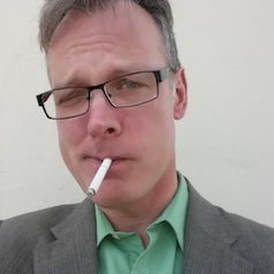The reason I say Heath Lowrance is an organically cool non-hipster is because he is utterly unpretentious as both a writer and a human being, at least from what I know of his internet persona, since we’ve never met in person. There’s nothing phony about his work, either, which pretty much confirms this image, at least for me. His frequent Facebook posts are always personable, original, conversational, and sometimes even provocative.
Judging from his profile pics, he even looks like a stylistically smooth, effortlessly witty, suavely cynical, old school cult writer type a la Jim Thompson, Hunter S. Thompson, or a very, very neat Charles Bukowski. Fortunately for his readers, whether of his fiction or social media updates, he writes like one, too. In a recent blog post, your write about a "generation gap” in cultural consciousness between people of a certain vintage (like us) and younger folks. When you write, does this awareness of that gulf in reference points affect how your target a broader audience? You’re talking about the post about how our generation was the last to be able to “discover” old movies on television accidentally, right? Yeah, that’s something I feel really fortunate to have been able to experience, and it’s a drag that generations after ours didn’t have, through no fault of their own. We had less choice about what to watch back in those “four or five channel” days, compared to the endless choices now, and it sometimes led us to discover some amazing things. But to answer your question, there are certain generational references that can be a stumbling block in the way of understanding between vintage old geezers like us and younger generations, but I don’t think it’s nearly as pronounced as some would have us believe. I don’t target an audience in that sense, anyway. I make the broad assumption that the reader more or less knows what I’m talking about if I’m making generational references, in the same way the writers of a show like Stranger Things make the assumption that the younger viewers are going to more or less grasp landline telephones and bunny ears on the television. In other words, I’d say “gulf” is putting too fine a point on it. You and I understood the culture of the 1940s, long before our time, when we grew up watching old film noirs, and younger viewers now get the 60s or 70s or 80s. You work in hybrid genres (also like me), all of which seemingly distill to the general category of noir (or often in your case, “psycho-noir"). Why do you think that’s a common link between fields as disparate as horror and Westerns? Genres like crime, horror, and westerns (the way I write them anyway) are linked by two things specifically: a stripped down, almost archetypal nature, where dramatic events unfold in their rawest form, and a sense of— and forgive me for trotting out this old concept again— existential hopelessness. Things don’t always have to end unhappily (although I can’t stand a happy ending) but those three genres in particular really lend themselves to dark, dark stories with almost primeval dramatic elements, free of distractions. Speaking of borders that bleed and blend, your residential background is pretty eclectic, having lived in several different parts of the country, which as we all know, has never felt more divided. How do your life experiences in this different places influence your stories and characters, if at all? I’ve never felt attached to any one place or time. I’m not sentimental for places or people, and even though I’m not a misanthrope I’ve always felt a slightly sad disconnect from most other humans. When I DO have a connection, I cling to it fiercely. I think that ailment came from moving around so much as child and a young man. My central characters tend to be disaffected and rootless and more than a little at odds with the society they are a part of, and that’s probably related to my own lack of a grounding influence. What are you influences, literary or otherwise? Jim Thompson, Charles Willeford, Richard Stark, Flannery O’Connor, and Robert E. Howard probably had the biggest impact on me as far as style and subject matter. But we’re influenced by almost everything we come in contact with, aren’t we? I’m influenced by bad 70s television and punk rock and Hammer horror films and Robert Mitchum and the Coen Brothers and comic books. I generally pay attention to the world around me, the pop culture and the language, and so new influences are always creeping in. What’s next for you? Every time I talk about what’s coming, I wind up not doing what I said I was going to do. But let’s risk it: I’m working on a handful of things at once, including a new Hawthorne weird western tale (about two years overdue!) a novel that takes pace in sunny Florida in the 1960s, and a handful of new weird short stories in various stages of completion. In some ways I feel like I’ve been redefining myself as a writer in recent months, breaking away from my old habits and obsessions and entertaining new ones. I haven’t released much these last couple years, but I hope to make up for that in 2018. Keep swingin’, my brother from another mother. Bio: Heath Lowrance is the author of The Bastard Hand, City of Heretics, Dig Ten Graves, and Hawthorne: Tales of a Weirder West, as well as the Gideon Miles novella Miles to Little Ridge and, as Jack Tunney, the Fight Card novel Bluff City Brawler. Website: http://psychonoir.blogspot.com/ PHOTO: HEATH LOWRANCE |
Categories
All
Archives
November 2023
|
|
Locations:
New Orleans, LA Nashville, TN |
|
Digital Media Ghost @2020
|



 RSS Feed
RSS Feed
